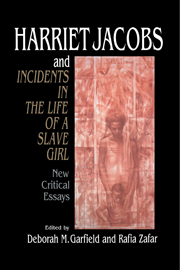Book contents
- Frontmatter
- Contents
- Introduction: Over-exposed, Under-exposed: Harriet Jacobs and Incidents in the Life of a Slave Girl
- “I Disguised My Hand”: Writing Versions of the Truth in Harriet Jacobs's Incidents in the life of a Slave Girl and John Jacobs's “A True Tale of Slavery”
- Through Her Brother's Eyes: Incidents and “A True Tale”
- Resisting Incidents
- Manifest in Signs: The Politics of Sex and Representation in Incidents in the life of a Slave Girl
- Earwitness: Female Abolitionism, Sexuality, and Incidents in the life of a Slave Girl
- Reading and Redemption in Incidents in the Life of a Slave Girl
- Harriet Jacobs, Frederick Douglass, and the Slavery Debate: Bondage, Family, and the Discourse of Domesticity
- Motherhood Beyond the Gate: Jacobs's Epistemic Challenge in Incidents in the Life of a Slave Girl
- “This Poisonous System”: Social Ills, Bodily Ills, and Incidents in the Life of a Slave Girl
- Carnival Laughter: Resistance in Incidents
- Harriet Jacobs, Henry Thoreau, and the Character of Disobedience
- The Tender of Memory: Restructuring Value in Harriet Jacobs's Incidents in the Life of a Slave Girl
- Conclusion: Vexed Alliances: Race and Female Collaborations in the Life of Harriet Jacobs
- List of Contributors
- Index
- CAMBRIDGE STUDIES IN AMERICAN LITERATURE AND CULTURE
Introduction: Over-exposed, Under-exposed: Harriet Jacobs and Incidents in the Life of a Slave Girl
Published online by Cambridge University Press: 22 January 2010
- Frontmatter
- Contents
- Introduction: Over-exposed, Under-exposed: Harriet Jacobs and Incidents in the Life of a Slave Girl
- “I Disguised My Hand”: Writing Versions of the Truth in Harriet Jacobs's Incidents in the life of a Slave Girl and John Jacobs's “A True Tale of Slavery”
- Through Her Brother's Eyes: Incidents and “A True Tale”
- Resisting Incidents
- Manifest in Signs: The Politics of Sex and Representation in Incidents in the life of a Slave Girl
- Earwitness: Female Abolitionism, Sexuality, and Incidents in the life of a Slave Girl
- Reading and Redemption in Incidents in the Life of a Slave Girl
- Harriet Jacobs, Frederick Douglass, and the Slavery Debate: Bondage, Family, and the Discourse of Domesticity
- Motherhood Beyond the Gate: Jacobs's Epistemic Challenge in Incidents in the Life of a Slave Girl
- “This Poisonous System”: Social Ills, Bodily Ills, and Incidents in the Life of a Slave Girl
- Carnival Laughter: Resistance in Incidents
- Harriet Jacobs, Henry Thoreau, and the Character of Disobedience
- The Tender of Memory: Restructuring Value in Harriet Jacobs's Incidents in the Life of a Slave Girl
- Conclusion: Vexed Alliances: Race and Female Collaborations in the Life of Harriet Jacobs
- List of Contributors
- Index
- CAMBRIDGE STUDIES IN AMERICAN LITERATURE AND CULTURE
Summary
As the coeditor of this volume, my tasks have been fairly specific and predictable: I have provided editorial feedback to the contributors, served as a liaison between scholars and press, and written this introductory essay. As a scholar of African American literature who happens also to be an African American female, however, the questions associated with my tasks have been less specific but perhaps more taxing: Where do I stand in relation to this undertaking? That is to say, has my role in putting together this collection, on the autobiography of a long-deceased, female, ex-slave, been overdetermined? Fellow scholar Ann duCille noted recently that the rapid increase of scholarship about black women has “led me to think of myself as a kind of sacred text. Not me personally, of course, but me black woman object, Other.” What does it mean, she inquired, for “black women academics to stand in the midst of … the traffic jam … that black feminist studies has become?” For to introduce a collection of essays about Harriet Jacobs is not simply to present a body of scholarly works; it is also to comment upon the curious resurrection of one particular “black woman object” and her justly renowned autobiography, Incidents in the Life of a Slave Girl.
Such comments may seen strange indeed, especially within the context of an essay that seeks to situate Harriet Jacobs and her contemporary critics for a heterogeneous leadership.
- Type
- Chapter
- Information
- Harriet Jacobs and Incidents in the Life of a Slave GirlNew Critical Essays, pp. 1 - 10Publisher: Cambridge University PressPrint publication year: 1996
- 1
- Cited by



